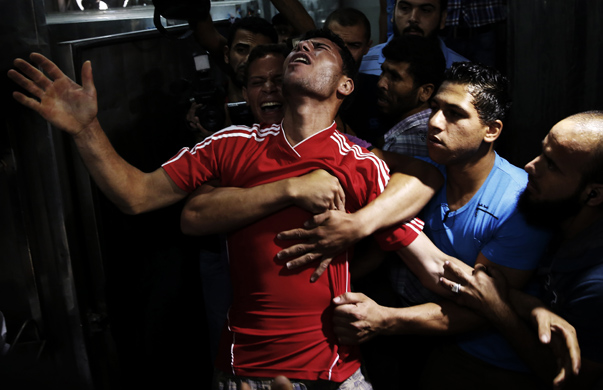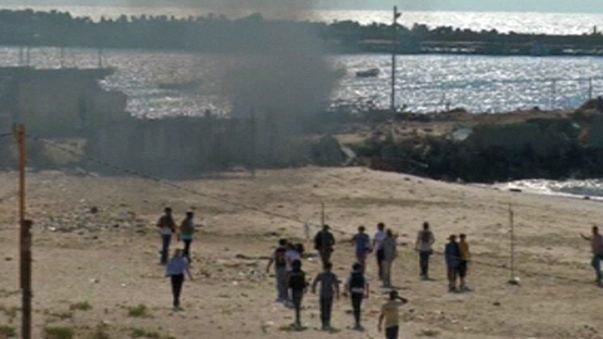UN: Israel and Palestinians may both be guilty of war crimes in Gaza conflict
The United Nations has found credible allegations of war crimes by both sides in the conflict in Gaza last summer.
A report by the UN Independent Commission into the 51-day war concluded that “the extent of devastation and human suffering in Gaza was unprecedented and will impact generations to come”.
The UN report was particularly critical of Israel for what it said was its “lamentable track record” in holding perpetrators of alleged violations accountable.
While noting that accountability on the Palestinian side was also “woefully inadequate”, the report was particularly critical of investigations by the Israeli military.
 An Israeli mobile artillery unit fires at the Gaza Strip (picture: Reuters).
An Israeli mobile artillery unit fires at the Gaza Strip (picture: Reuters).
Israel refused to co-operate with the inquiry and denied UN investigators access to Gaza. It has repeatedly dismissed the UN commission as a “kangaroo court“.
Last week, Prime Minister Benjamin Netanyahu said reading its report would be “a waste of time”.
The Independent Commission’s remit was to investigate possible war crimes by both the Israeli Defence Forces (IDF) and Palestinian armed groups.
 A woman mourns after Israeli citizen Dror Khenin, 37, was killed by a Hamas strike (Reuters).
A woman mourns after Israeli citizen Dror Khenin, 37, was killed by a Hamas strike (Reuters).
It highlighted its “serious concerns” over the “inherently indiscriminate nature of most of the projectiles directed towards Israel… and the targeting of civilians”.
These, it said, may amount to a war crime by Palestinian militants – as did the extrajudicial executions of Palestinians alleged to have collaborated with Israel.
 Militants hold back crowds at a Gaza mosque before executing 18 men for allegedly helping Israel.
Militants hold back crowds at a Gaza mosque before executing 18 men for allegedly helping Israel.
But the bulk of the report focused on alleged Israeli violations of the laws of war. It said that “questions arise regarding the role of senior officials who set military policy” which resulted in what it described as “new patterns” in Israeli attacks.
These, it said, included attacks on residential buildings, resulting in the deaths of entire families and ground operations which levelled urban neighbourhoods.
In a news conference in Geneva, Doudou Diene, a Senegalese lawyer and deputy chairman of the UN Commission, said: “This war has been maybe one of the best covered wars by the media… Day after day, there was not anything which shows there has been a decision to stop or diminish the attacks on buildings and civilians.”
He concluded that: “Somewhere, in the chain of command, there has been a position which allowed this.”
The UN inquiry singles out an incident on 16 July last year when four Palestinian boys who had been playing on the beach in Gaza City were killed in a succession of Israeli missile strikes.
The UN report states that “the commission found strong indications that the IDF failed in its obligations to take all feasible measures to avoid… incidental harm to civilians”.
Ten days ago, the Israeli Military Advocate General exonerated commanders responsible for the killings of the four boys , ruling that the attack accorded with Israeli and international law. The IDF personnel were found to have exercised “professional discretion”.
The UN’s findings directly and pointedly contradict this and the report states that “the commission is disturbed by Israel’s decision to close its criminal investigation” into this incident.
At today’s news conference in Geneva, the Commission’s Chairperson, Mary McGowan Davis – a former New York State Supreme Court Judge – criticized the Israeli military investigators’ failure to take witness statements from those who saw what happened.
“Many journalists present at the hotel… who were right there when this happened on the public beach, were not actually spoken to. Nobody has made public to my knowledge the actual drone pictures that they say made these little nine, 10-year-old boys look like 20-year-old militants or what have you.
“I think it’s very disappointing and it does not necessarily augur well for what the investigative process will demonstrate here.”
 A brother of one of the four young victims mourns his death (Reuters).
A brother of one of the four young victims mourns his death (Reuters).
The UN investigation noted what it called “a huge increase in firepower used in Gaza”, noting that there had been more than 6,000 Israeli airstrikes and that the IDF had fired approximately 50,000 tank and artillery rounds. “Hundreds of Palestinian civilians were killed in their own homes”, it said.
The UN Commission examined Israel’s “extensive use of weapons with a wide kill and injury radius”. It said that “though not illegal, their use in densely populated areas is highly likely to kill combatants and civilians indiscriminately”.
Last week, the Israeli government released its own report into the conflict. It said no Israeli or international laws had been broken in attacks which had caused civilian deaths.
It concluded that these deaths were “unfortunate – yet lawful – incidental effects of legitimate military action”. The Israeli report also found that of the 2,125 fatalities in Gaza, just 761 were civilians – fewer than half the number cited by the UN.
An organisation for Israeli combat veterans called Breaking the Silence released a report in May in which soldiers who had served in the IDF in Gaza last summer described “permissive rules of engagement”.
Around 60 soldiers testified anonymously. One said “There were no rules of engagement.” Others spoke of randomly firing artillery to avenge fallen comrades and shooting at civilians out of boredom.
The UN report was to have been published in March but was delayed following the resignation of the chairman after Israeli allegations of bias due to past paid legal work he had undertaken for the Palestinian Liberation Organisation.
The new chairperson, Ms McGowan Davis, was appointed. The Israeli Prime Minister demanded the report be shelved.
Ahead of the release of the UN report, the Israeli government also attacked foreign media over what it viewed as biased coverage of the conflict in Gaza.
Follow @millerC4 on Twitter


